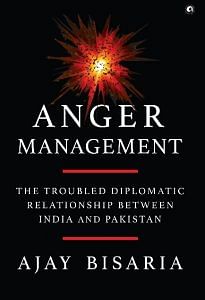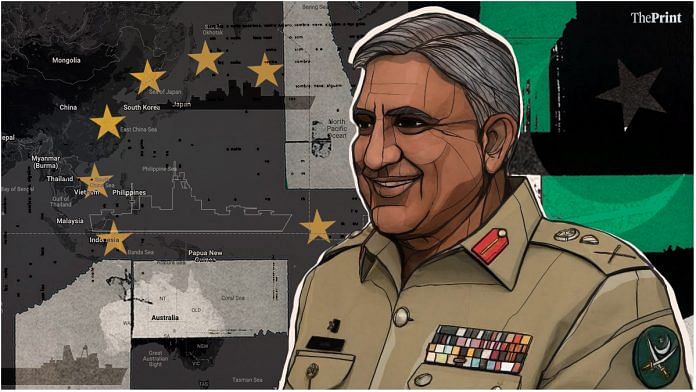The doctrine quite randomly predicted a rapprochement with India in three years, since there could be no war between ‘two neighbouring nuclear countries’ and because the ‘extremist Modi regime’ within two to three years ‘due to its growing economy’ would realize the need for a peace dialogue with Pakistan. It also spoke of peace with Afghanistan. The strategy to counter terror included an element of ‘mainstreaming’ of terrorists and radicals (even inviting them to fight elections), giving a glimmer of hope that Pakistan would be willing to tackle the groups the ISI had created for proxy terror against India.
In that sense, it took forward the Kayani doctrine of strengthening the fight against terrorism, rejecting ‘the old idea of distinguishing between good or bad Taliban’ and adding that militant groups needed to be ‘de-weaponised and mainstreamed’ like in Ireland. But the groups in Pakistan were expected to be deweaponized with no credible effort to have them first deradicalized. I did share my concern with some Western diplomats discussing these issues with Bajwa—the mainstreaming of the radicals could lead to radicalizing the mainstream.
Dawn was not wholly impressed by Bajwa’s briefing and gently chided the army for overstepping its boundaries pointing out that ‘economic policy, centre-province relations and governance matters…are civilian domains’; howsoever desirable, improvements in these ‘must flow through constitutional channels.’
The Bajwa doctrine faced another criticism from within Pakistan—it was not tough enough on the Kashmir cause. What the doctrine left unsaid was Bajwa’s (and, by extension, the Pakistani army’s) belief in political engineering with the hybrid government project, that involved ejecting the elected PM, Nawaz Sharif, in 2017 and bringing in the ‘selected’ Imran Khan in 2018. The doctrine would add more elements as Bajwa would grow on the job—like a stronger posture against domestic terrorism, a professed political neutrality, and a longer tenure for Bajwa to rule Pakistan.
Also read: Before JeM chief’s listing as terrorist at UNSC, Pakistan asked China one thing. No more
Connecting with the Army
After the doctrine was aired, almost on cue, the military invited me along with some of my colleagues, including the deputy high commissioner, J. P. Singh, and the defence attachés, to the Pakistan Day parade on 23 March. This was a courtesy extended to India after several years. Yaum-e-Pakistan, or Pakistan Resolution Day, was a national holiday in Pakistan, commemorating the Lahore Resolution passed on 23 March 1940 (with the Muslim League’s call for the creation of separate Muslim homelands as ‘independent states’ in India) but also celebrating the first short-lived Constitution of 1956, which technically graduated Pakistan from dominion to republic.
On a blazing hot day in Islamabad, we attended the army’s Pakistan Day parade, gazing at the marching contingents. We found our faces, squinting in the sun, in every Pakistani newspaper and channel the next morning. The invitation was variously interpreted as a peace gesture and a warning to India, depending on the editorial inclination of the publication. I was amused to find myself the subject of a lengthy and angry enquiry by an Indian TV channel, wondering why we would not boycott a Pakistani parade.
That diplomats in both countries routinely attended National Day parades and functions was not an argument the channel was willing to countenance. While we were happy to play along with Pakistan’s invites, the bottom line for India was interpreting the situation on the ground, rather than the gestures. It was clear to us in the summer of 2018 that the army was not keen to take direct control of power, despite having removed Nawaz Sharif from the scene. It was apparent that there was something deeper afoot for the upcoming federal elections.
The army was now building Imran Khan and creating conditions for his victory. It had the makings of a ‘non-coup coup’, with the army prepping a ‘hybrid’ regime, where it would not only not take over the reins of power, it would not need to. We decided to initiate conversations with the army to sensitize them to India’s concerns on violence and terrorism. The communication needed to be away from any spotlight. I had no mandate to meet Bajwa, even if he were willing to meet me. But I could be creative and communicate with Pakistan’s most powerful man through people close to him. We made it clear to the army that India no longer had the patience for words and the ‘no talks with terror policy’ was a fact. The position could change if Pakistan could show some sincerity in tackling terrorism against India.
One basic metric of this would be a fall in the verifiable cross-border infiltration numbers. Another test would be whether Pakistan could hand over those responsible for past terrorist attacks on India. This process could begin with the twenty-six Indian citizens we knew were being given safe haven by Pakistan. Bajwa conveyed Pakistan’s sincere desire to end terrorism, but signalled in mid-2018 that we would continue this conversation once the new government was in place in Islamabad.
This demonstrated confidence that the government put in place would be on the ‘same page’ as the army. However, it was Pakistan’s assessment that India would find it hard to have any conversation until the election of a new government in India in May 2019. The window, the army was guessing in 2018, would only open in the second half of 2019, after Indian elections, when the political rhetoric would have dampened.
In retrospect, while the Pakistan Army was making a reasonably smart assessment, it was in 2018 not factoring in a few black swan events that would change the shape of the next year—the Pulwama terrorist attack, the Balakot response, and the Article 370 decision by India. It would appear that Bajwa modestly spoke of a window of opportunity between Indian elections until his date of retirement in November 2019, in which he would work for a lasting peace.
 This excerpt from Ajay Basaria’s book ‘Anger Management: The Troubled Diplomatic Relationship between India and Pakistan’ has been published with permission from Rupa Publications.
This excerpt from Ajay Basaria’s book ‘Anger Management: The Troubled Diplomatic Relationship between India and Pakistan’ has been published with permission from Rupa Publications.



